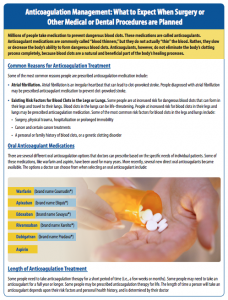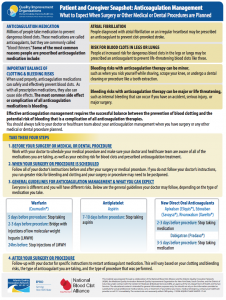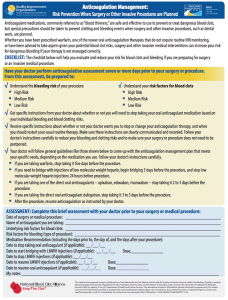Managing Anticoagulants Before, During, and After Medical Procedures
 Millions of people depend on anticoagulants – also known as “blood thinners” – to prevent life-threatening blood clots. While these medications do not actually “thin” the blood, they do slow the body’s ability to form dangerous blood clots, such as blood clots in the arms or legs (deep vein thrombosis or DVT) and blood clots in the lungs (pulmonary embolism or PE). Blood thinners, however, do not completely stop the body’s ability to clot, because blood clots are a beneficial part of healing from an injury. For example, if you cut your finger with a kitchen knife, your body naturally works to stop you from bleeding too much.
Millions of people depend on anticoagulants – also known as “blood thinners” – to prevent life-threatening blood clots. While these medications do not actually “thin” the blood, they do slow the body’s ability to form dangerous blood clots, such as blood clots in the arms or legs (deep vein thrombosis or DVT) and blood clots in the lungs (pulmonary embolism or PE). Blood thinners, however, do not completely stop the body’s ability to clot, because blood clots are a beneficial part of healing from an injury. For example, if you cut your finger with a kitchen knife, your body naturally works to stop you from bleeding too much.
As with any medication you take, there are potential risks when taking blood thinners. These risks include unwanted or even dangerous bleeding. Bleeding risks can be particularly overwhelming to think about, especially if you are preparing for a surgical, dental, or other medical procedure.
Despite the effectiveness of blood thinners, preventable bleeding and clotting events still happen, especially before, during, and after surgery or other medical procedures. Surgery and invasive medical procedures can increase the risk of serious bleeding. Stopping blood thinners can increase your risk for blood clots, due to the underlying risk factor(s) for which your blood thinner was originally prescribed. Many times, these bleeding and clotting risks can be complicated for you to understand, and difficult for your healthcare providers to manage.
It is just as important for you to understand your bleeding and clotting risks as it is for the doctors who are caring for you to manage these risks. The National Blood Clot Alliance, in partnership with IPRO, has developed several downloadable materials to help you understand your risks, and manage your blood thinners, before, during, and after surgical, dental, or other medical procedures.
Materials to Help You Manage Anticoagulants Before, During and After Surgery or Other Medical Procedures
Anticoagulation Management: What to Expect Before, During, and After Surgery or Other Medical Procedures
This detailed fact sheet provides a complete description of the different blood thinners that are available, and explains how they can be used to help prevent blood clots, and unwanted bleeding, before, during, and after surgical, medical, or dental procedures.
Every person is different, and every situation needs to be managed carefully. Use this fact sheet before any invasive medical or dental procedure to help you understand your bleeding and clotting risks, and how to best manage your blood thinner.
Click here for more information: What to Expect Before, During, and After Surgery or Other Medical Procedures
Quick Reference: What to Expect Before, During, and After Surgery or Other Medical Procedures
This is a one-page summary of the detailed fact sheet above. It describes each of the available blood thinners, and explains how they can be used to help prevent blood clots, and unwanted bleeding, before, during, and after surgical, medical, or dental procedures.
Use this summary as a quick reference guide before any invasive medical or dental procedure to help you understand your bleeding and clotting risks, and how to best manage your blood thinner.
Click here for more information: Quick Reference: What to Expect Before, During, and After Surgery or Other Medical Procedures
Understanding Anticoagulant Risk Prevention When Surgery or Other Procedures are Planned
This simple plan will help you understand how your medication schedule may change to help prevent blood clots and unwanted bleeding before, during, and after your surgery, or other dental or medical procedure.
Use this sheet to have a conversation with your doctor, or healthcare provider, and record specific instructions for staring and stopping your blood thinner, if necessary.
Click here for more information: Risk Prevention When Surgery or Other Procedures are Planned
Test Your Knowledge
After reading the materials above, test your knowledge with this quiz.
Share and discuss the results with your doctor, or other healthcare provider, to make sure you understand how to best manage your blood thinner before, during, and after surgical, dental, or other medical procedures.
Click here to take the quiz: Test Your Knowledge








